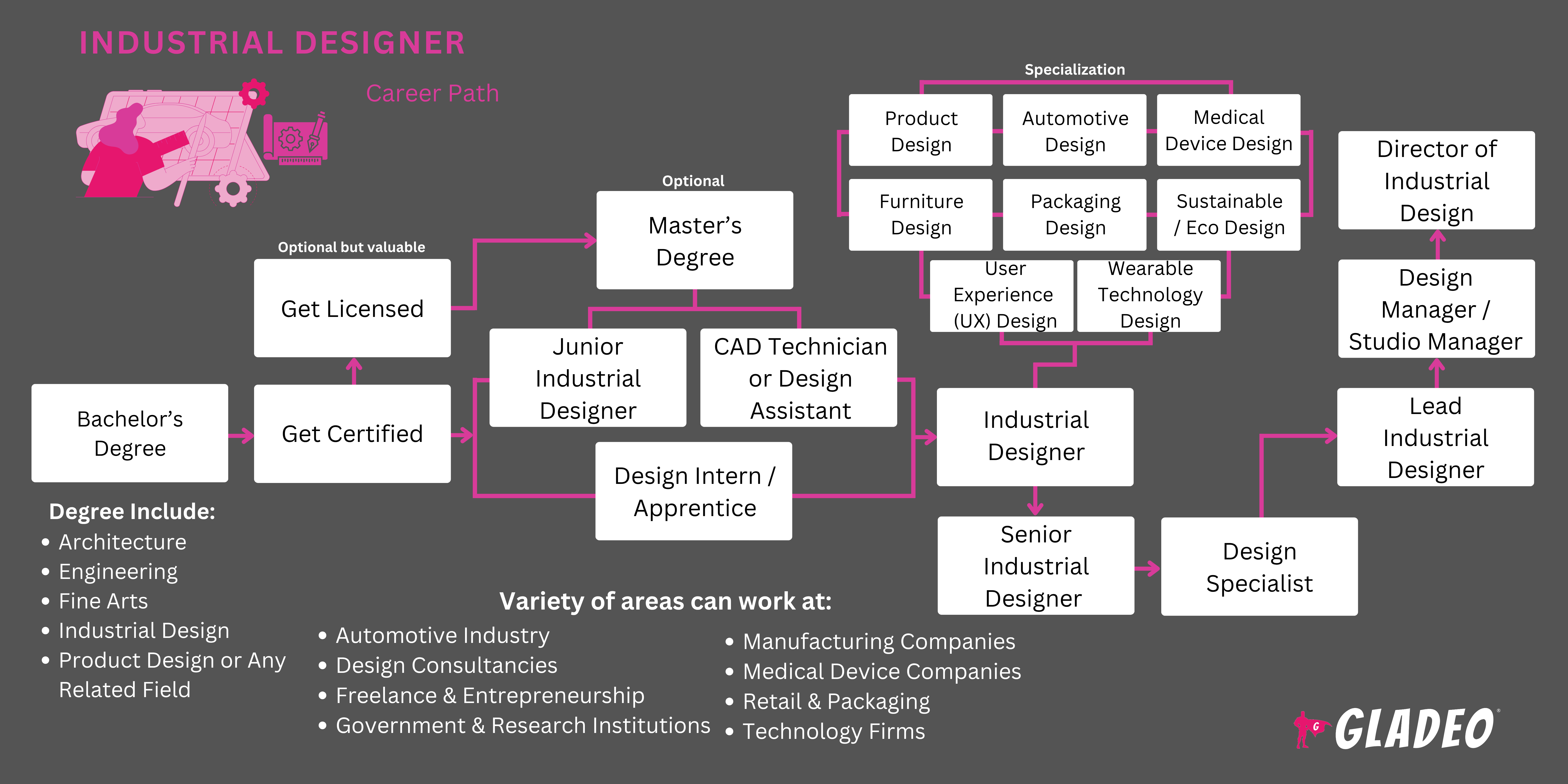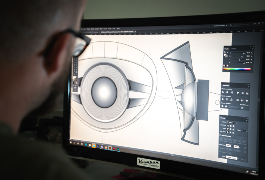Spotlights
Design Engineer, Product Designer, Mechanical Designer, Product Development Engineer, Commercial Designer, Product Developer
Nearly every product we use today was created by an Industrial Designer. They may not have held that exact title, but an Industrial Designer is responsible for the development of new products. For new items to enter the market today, there is a team of people behind the scenes ensuring that it is usable and safe, and leading that effort is an Industrial Designer.
Although not all of them perform all aspects of the job, Industrial Designers are creative individuals that spearhead the development of new products. Starting from the ground up, a concept is created with the artistic vision of an Industrial Designer via sketches, mockups, or rudimentary models or molds. These concepts then go through a team of other design professionals like engineers, manufacturers, software developers, and marketing professionals to get the product from idea to consumer readiness.
The Industrial Designer is involved through the creation process, implementing advice and specifications from engineers and manufacturers to help the product evolve into one that can be released to consumers.
Industrial Designers often find the work itself rewarding, especially if they are a natural creator and innovator. They can create products that genuinely help people or the environment, and get to see their ideas turn into real-life products. Aside from the ability to help others through designing or refining creations, some products can go on to genuinely change the world we live in, just from the idea of one person.
An Industrial Designer is responsible for helping a product go from idea to consumer-ready. They are often required to brainstorm a concept that a company has asked for directly and then provide follow-up by presenting that concept in a visual format, such as a sketch or CAD rendering. After engineering teams provide input, it is ‘back to the drawing board to implement the necessary usability requirements. As the product goes through the entire design and testing process, the Industrial Designer revisits the original product many times to make adjustments. They aid in managing the rest of a design team to fully integrate the different aspects of physical production, safety concerns, marketability, software and User Interface, etc.
Nhiệm vụ tiêu biểu
- Arrange production of samples
- Communicate with company leaders and customers
- Create physical models of concepts in many mediums from woodworking to 3D printing
- Include aesthetic design principles with usability requirements
- Investigate alternative uses of products that are already on the market
- Oversee assistant’s work and help manage a design team
- Prepare illustrations, blueprints, and digital renderings of design concepts
- Present ideas, design modifications, and consumer use guides to research and development teams
- Research market needs and marketing procedures
- Research production costs
- Understand and develop industry standards for design and production
Trách nhiệm bổ sung
- Aid corporate entities with their image goals
- Attend and present information at professional conferences and events
- Incorporate decorative designs
- Prepare material to ‘pitch’ ideas to companies
Kỹ năng mềm
- Lắng nghe tích cực
- Administrative
- Attention to Detail
- Creativity
- Mathematics
- Sales and Marketing
- Technology
- Verbal and Written Communication
Kỹ năng kỹ thuật
- Desktop Publishing
- Digital Cameras
- Internet Research/Browsing
- Video Creation and Editing
- Various types of design software such as:
- Adobe Suite
- Autodesk 3ds Max
- Dassault Systemes
- Eko
- JavaScript
- Mathworks
- QuarkXpress
- Siemens NX
Industrial Designers usually work inside an office setting, although some of their work can be done from home. They may also travel to different facilities through the design process, including testing and design shops or client homes and facilities.
One of the biggest sacrifices that Industrial Designers make is sacrificing time to the job. Projects may take a lot of time that is not scheduled for because of the evolving nature of the projects and the quality control needs. They are expected to work within the timeline of other parts of the design team, which can include unexpected setbacks.
An Industrial Designer is also expected to create useful and safe products, which can be a daunting idea. They’re expected to think forward to how the designs can be used or misused, and plan ahead for those possibilities.
Industrial Design is expected to experience an average growth rate in the next few years, although the move from manufacturing inside of the U.S. could cause that to decrease slightly.
With new products going into the market every day, and innovation continues at a rapid pace in the technology sector, the need for designers is still stable and growing.
One of the main traits that Industrial Designers share is a very strong sense of imagination. As children, the designers were often involved heavily in make-believe play, and in building and constructing toys like Legos. They also likely had artistic talent, either in drawing and sculpting or in digital design. Even video games like Minecraft provide a solid foundation for the creation and construction of projects, products, and models.
- A Bachelor’s Degree is the minimum education needed for most Industrial Designers
- Common fields of degree include fine arts, engineering, or architecture. Most industrial design programs include courses in drawing, computer-aided design and drafting (CADD), and three-dimensional modeling, as well as courses in business, industrial materials and processes, and manufacturing methods.
- Additional coursework in design may be needed prior to acceptance to a Bachelor’s Degree Program at some colleges
- Internships/Apprenticeships within the design are available although not necessary for many jobs
Some common Bachelor’s Degree fields of study include Fine Arts, Engineering, and Architecture. Areas of focus to look for in a university are programs that offer courses in CAD design, manufacturing process, and business management. The National Association of Schools of Art and Design (NASAD) offers accreditation to approximately 350 schools and is a great standard to start your school search with.
- Decide if you want to specialize in any area and note what additional education you may need for that specialty
- Explore Preparatory Classes
- Get a head start on CAD design with some beginner friendly software
- Look into whether your state offers the chance to work towards your degree while still in high school.
- Maintain a high GPA
- Prepare a design portfolio prior to college enrollment
- Pursue continuing education in additional design courses to expand your portfolio

- Check with your school’s resource center to see if you qualify for any job placement assistance
- Find employment resources within professional organizations such as the Industrial Designers Society of America (IDSA)
- Find the geographic location you would prefer to work in and look for all possible Industrial Design openings
- Have a polished, professional portfolio available
- Polish your resume and check that you have included relevant data. It is a good idea to learn how to highlight your achievements in school if you are entering the workforce right out of college
- Prepare for your interview by checking out industry specific tips on acing your interview
- Provide references from schools or previous employers
Industrial Designers that work within firms can achieve higher positions such as Chief Designer or Department Head. Continuing education to stay up to date on the latest in technology and design is one great way to move ahead in the industry. Working well within a team is also very important and shows that you can receive feedback and integrate it into your work.
For the more entrepreneurial-minded, building a great portfolio can aid you in opening your own design firm or providing design services with your own business. Having a portfolio of projects, even unsuccessful ones, can highlight your unique processes.
Trang web
Sách vở
- Start at the End: How to Build Products That Create Change, by Matt Wallaert
- The Design of Everyday Things, by Don Norman
- The Design Thinking Playbook: Mindful Digital Transformation of Teams, Products, Services, Businesses and Ecosystems, by Michael Lewrick, Patrick Link, and Larry Leifer
Because of the multifaceted nature of being an Industrial Designer, there are many other jobs that also utilize imagination, creativity, artistic talent, and the ability to use design software. They include careers like:
- 3D Modeler
- Architect
- Artists
- Fashion Designer
- Graphic Designer
- Industrial Engineer
- Mechanical Drafter
- Safety Engineer
- Software Developer
Nguồn cấp tin tức

Công việc nổi bật

Các khóa học và công cụ trực tuyến








